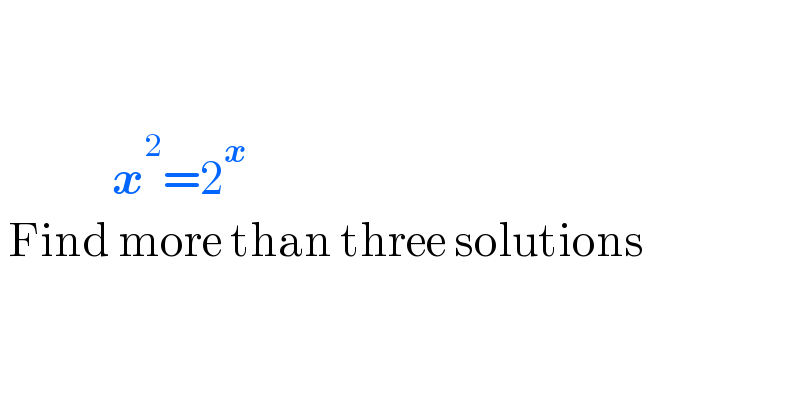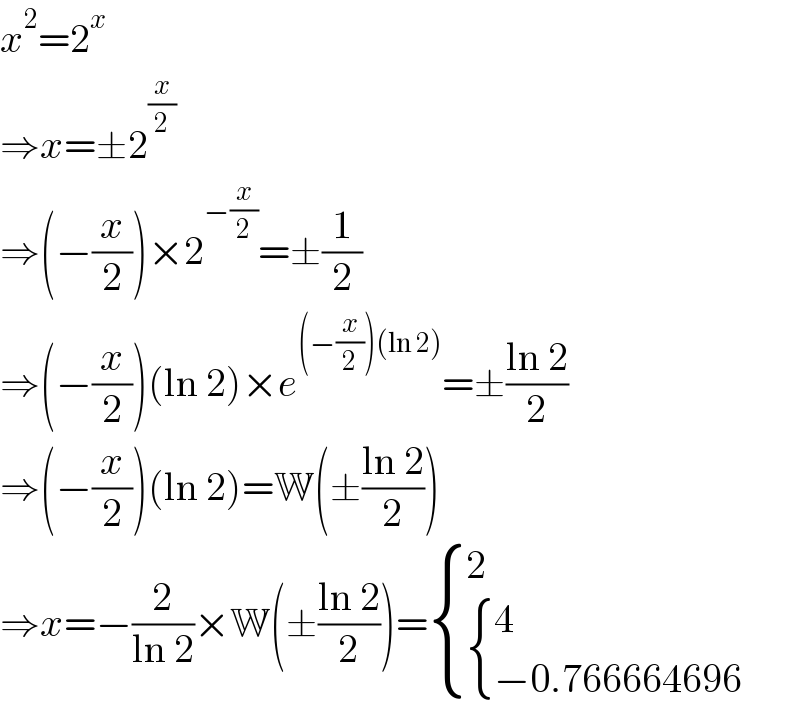
Question Number 211675 by MrGaster last updated on 16/Sep/24

$$ \\ $$$$ \\ $$$$\:\:\:\:\:\:\:\:\:\:\:\:\:\:\boldsymbol{{x}}^{\mathrm{2}} =\mathrm{2}^{\boldsymbol{{x}}} \\ $$$$\:\mathrm{Find}\:\mathrm{more}\:\mathrm{than}\:\mathrm{three}\:\mathrm{solutions} \\ $$$$ \\ $$
Commented by mr W last updated on 16/Sep/24

$${but}\:{there}\:{are}\:{only}\:{three}\:{solutions}! \\ $$
Answered by mr W last updated on 16/Sep/24

$${x}^{\mathrm{2}} =\mathrm{2}^{{x}} \\ $$$$\Rightarrow{x}=\pm\mathrm{2}^{\frac{{x}}{\mathrm{2}}} \\ $$$$\Rightarrow\left(−\frac{{x}}{\mathrm{2}}\right)×\mathrm{2}^{−\frac{{x}}{\mathrm{2}}} =\pm\frac{\mathrm{1}}{\mathrm{2}} \\ $$$$\Rightarrow\left(−\frac{{x}}{\mathrm{2}}\right)\left(\mathrm{ln}\:\mathrm{2}\right)×{e}^{\left(−\frac{{x}}{\mathrm{2}}\right)\left(\mathrm{ln}\:\mathrm{2}\right)} =\pm\frac{\mathrm{ln}\:\mathrm{2}}{\mathrm{2}} \\ $$$$\Rightarrow\left(−\frac{{x}}{\mathrm{2}}\right)\left(\mathrm{ln}\:\mathrm{2}\right)=\mathbb{W}\left(\pm\frac{\mathrm{ln}\:\mathrm{2}}{\mathrm{2}}\right) \\ $$$$\Rightarrow{x}=−\frac{\mathrm{2}}{\mathrm{ln}\:\mathrm{2}}×\mathbb{W}\left(\pm\frac{\mathrm{ln}\:\mathrm{2}}{\mathrm{2}}\right)=\begin{cases}{\mathrm{2}}\\{\begin{cases}{\mathrm{4}}\\{−\mathrm{0}.\mathrm{766664696}}\end{cases}}\end{cases} \\ $$
Answered by Frix last updated on 16/Sep/24
![x^2 =2^x 2ln x =xln 2 −((ln x)/x)=−((ln 2)/2) x=e^(−t) e^t t+((ln 2)/2)=0 t=a+bi (e^a (acos b −bsin b)+((ln 2)/2))+e^a (asin b +bcos b)i=0 { ((e^a (acos b −bsin b)+((ln 2)/2)=0)),((e^a (asin b +bcos b)=0 ⇒ a=−bcot b)) :} ⇒ ((2b)/(sin b))−e^(bcot b) ln 2 =0 [approximate] t=−b(cot b −i) x=e^(bcot b) (cos b −i sin b) 2 solutions ∉R: b≈±7.45408757255 x≈9.09072986075±21.5079503505i](Q211693.png)
$${x}^{\mathrm{2}} =\mathrm{2}^{{x}} \\ $$$$\mathrm{2ln}\:{x}\:={x}\mathrm{ln}\:\mathrm{2} \\ $$$$−\frac{\mathrm{ln}\:{x}}{{x}}=−\frac{\mathrm{ln}\:\mathrm{2}}{\mathrm{2}} \\ $$$${x}=\mathrm{e}^{−{t}} \\ $$$$\mathrm{e}^{{t}} {t}+\frac{\mathrm{ln}\:\mathrm{2}}{\mathrm{2}}=\mathrm{0} \\ $$$${t}={a}+{b}\mathrm{i} \\ $$$$\left(\mathrm{e}^{{a}} \left({a}\mathrm{cos}\:{b}\:−{b}\mathrm{sin}\:{b}\right)+\frac{\mathrm{ln}\:\mathrm{2}}{\mathrm{2}}\right)+\mathrm{e}^{{a}} \left({a}\mathrm{sin}\:{b}\:+{b}\mathrm{cos}\:{b}\right)\mathrm{i}=\mathrm{0} \\ $$$$\begin{cases}{\mathrm{e}^{{a}} \left({a}\mathrm{cos}\:{b}\:−{b}\mathrm{sin}\:{b}\right)+\frac{\mathrm{ln}\:\mathrm{2}}{\mathrm{2}}=\mathrm{0}}\\{\mathrm{e}^{{a}} \left({a}\mathrm{sin}\:{b}\:+{b}\mathrm{cos}\:{b}\right)=\mathrm{0}\:\Rightarrow\:{a}=−{b}\mathrm{cot}\:{b}}\end{cases} \\ $$$$\Rightarrow \\ $$$$\frac{\mathrm{2}{b}}{\mathrm{sin}\:{b}}−\mathrm{e}^{{b}\mathrm{cot}\:{b}} \:\mathrm{ln}\:\mathrm{2}\:=\mathrm{0}\:\left[\mathrm{approximate}\right] \\ $$$${t}=−{b}\left(\mathrm{cot}\:{b}\:−\mathrm{i}\right) \\ $$$${x}=\mathrm{e}^{{b}\mathrm{cot}\:{b}} \left(\mathrm{cos}\:{b}\:−\mathrm{i}\:\mathrm{sin}\:{b}\right) \\ $$$$ \\ $$$$\mathrm{2}\:\mathrm{solutions}\:\notin\mathbb{R}: \\ $$$${b}\approx\pm\mathrm{7}.\mathrm{45408757255} \\ $$$${x}\approx\mathrm{9}.\mathrm{09072986075}\pm\mathrm{21}.\mathrm{5079503505i} \\ $$
